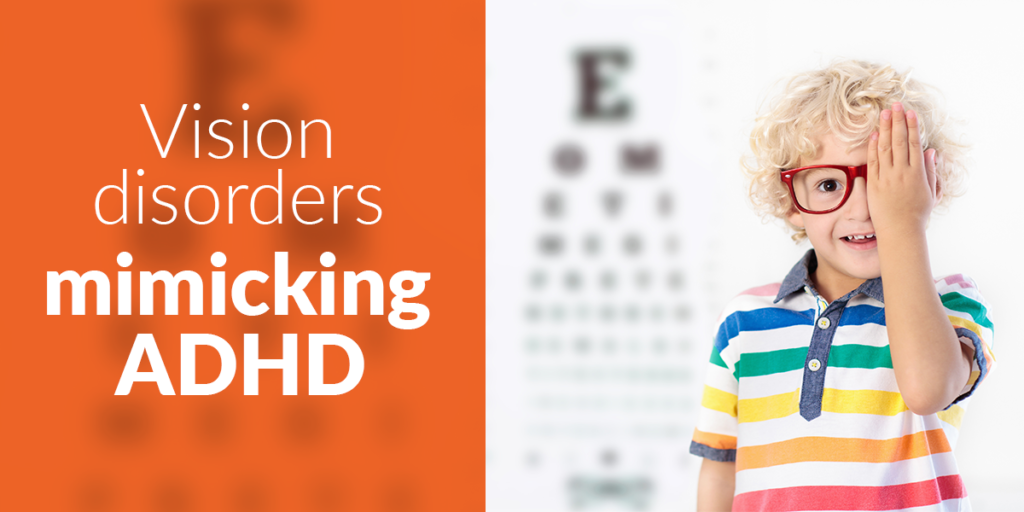In recent years, we’ve learned that some vision disorders can mimic ADHD or ADD symptoms.
A recent study by Decarlo et al. (2016) published in the Journal of Optometry and Vision Science found that children with vision problems (other than those correctable by prescription eyewear) are two times more likely to develop ADHD than peers without vision problems.
Vision problems can affect children’s executive functioning, including their ability to pay attention, focus, plan, and organize time and space.
In some cases, children with vision problems are even incorrectly diagnosed with ADHD/ADD and started on medication. As you can imagine, this doesn’t help them a whole lot as their vision disorder remains undiagnosed and untreated.
When we read, our eyes converge to focus on a word. When are eyes aren’t working properly, words get blurry, it’s hard to stay focused, hard to concentrate, and ultimately, really hard to read.
In children, trying to read when they simply are not able to can result in fidgeting, inability to focus, frustration, acting out, ‘behavior’ problems, fatigue, headaches, anxiety, and depression.
Sound familiar?
The solution, however, isn’t always as simple as getting glasses or getting diagnosed with ADHD (or, not getting diagnosed with ADHD).
Vision isn’t just about whether or not you can see without glasses.
Functional vision requires the ability to fixate on stationary objects, track moving objects, go back and forth from moving to stationary, and scan a room to find an object.
Sometimes the root issue is a vision disorder called convergence insufficiency (CI). In CI, the eyes are unable to work together to look at nearby objects, resulting in double vision or blurred vision.
Some studies even suggest there’s a threefold greater incidence of ADHD among people with convergence insufficiency (Granet et al., 2005).
When convergence insufficiency is an issue, vision therapy with a developmental optometrist or a vision therapist can help a child’s eyes work together.
HOW CAN YOU TELL THE DIFFERENCE BETWEEN A VISION PROBLEM AND ADHD?
Here are a few signs of actual functional vision problems (you’ll notice some of them are very similar to ADHD symptoms):
- Struggles with reading and/or writing
- Covers one eye when reading
- Develops disruptive classroom behaviors
- Cannot sit still
- Performs strongly at the beginning of an assignment, or the school day, but can’t make it to the end because of fatigue and anxiety
- Scores poorly on tests, despite knowing the material
- Has a short attention span
- Loses her place while reading, sees double, skips lines or words
- Appears careless when working, making frequent mistakes
Please note these signs are only meant to be a help to you — if you suspect your child has vision problems or ADHD, it’s time to seek the help of a qualified professional.
I SUSPECT MY CHILD HAS ADHD AND/OR VISION PROBLEMS — WHAT NOW?
If you suspect your child is struggling, experts suggest your child gets evaluated for functional vision problems by a certified optometrist, in addition to an ADHD evaluation. Of course, we always suggest kids get an annual eye exam (learn more about eye exams for kids here), whether or not any visual problems or behavioral problems are apparent.
Whatever the case, as a parent, your job is to be your child’s best advocate.
Larry Silver, M.D., in his short report, ‘It’s Not ADHD: 3 Common Diagnosis Mistakes’ argues that doctors and medical professionals are sometimes too quick to diagnose ADHD:
“Attention deficit disorder (ADD ADHD) is not easy to diagnose. Often when I am approached by parents who complain that medication “hasn’t helped,” or that it “helps, but my child is still struggling in school,” the problem isn’t the medication. It’s that the person doesn’t actually have ADHD — or has more than ADHD.”
In both children and adults, ADHD is sometimes over-diagnosed, or even when correctly diagnosed, it’s only a part of the problem. As in the case of one of Dr. Silver’s adult patients, Virginia, a 40-year old mother of four, he noted that “Yes, Virginia has ADHD. But she also has dyslexia and suffers from anxiety and OCD. To get better, Virginia needs to be treated for all four conditions.”
Do you have concerns for your child? A full, complete evaluation should always be performed when a child (or adult) is struggling in school or in life. Talk to your vision care provider to discuss your next steps so your child can get the help they need.
Sources:
- https://www.additudemag.com/adhd-and-vision-problems-understanding-symptoms/
- ADHD and Vision Problems in the National Survey of Children’s Health. DeCarlo et al., Optom Vis Sci. 2016 May;93(5):459-65. doi: 10.1097/OPX.0000000000000823.
- The Relationship Between Convergence Insufficiency and ADHD. Granet et al., Strabismus. 2005 Dec;13(4):163-8.
- When It Is Not ADHD: 3 Common Mistakes in ADHD Diagnosis by Larry Silver, M.D.

[formlift id=”806″]

